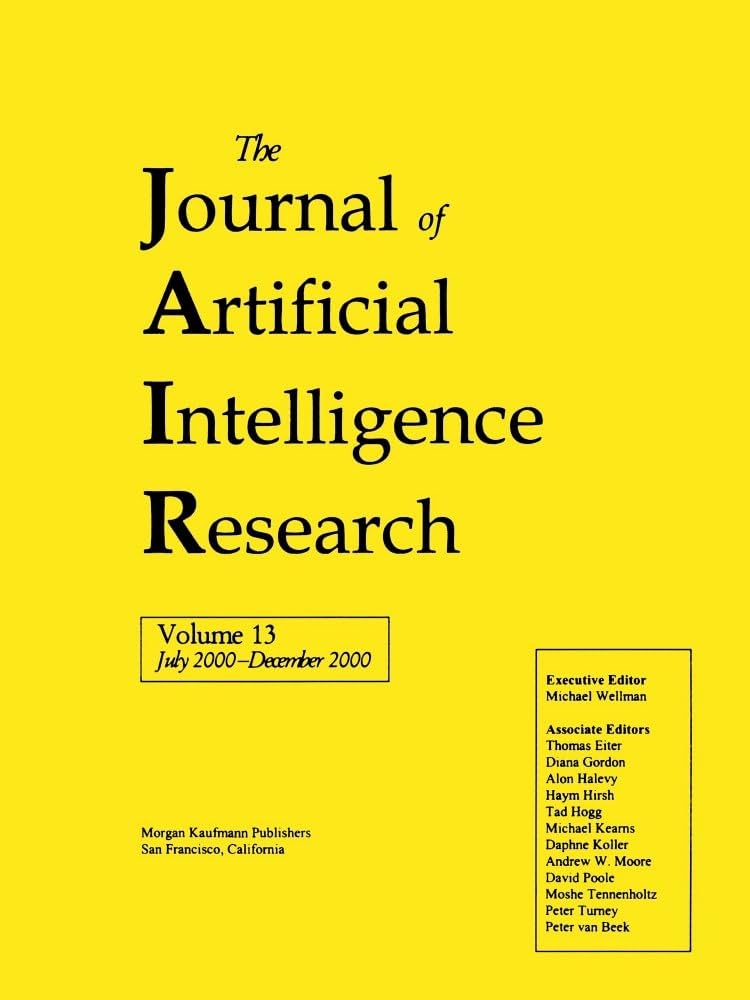生成随机SAT实例:多个解决方案可以预定义和深度隐藏
IF 4
3区 计算机科学
Q2 COMPUTER SCIENCE, ARTIFICIAL INTELLIGENCE
引用次数: 1
摘要
SAT实例的生成是计算机科学中的一个重要问题,它有助于研究人员验证SAT求解器的有效性。解决这个问题可以激发研究人员提出新的搜索策略。SAT问题存在于各种实际应用中,其中一些问题有不止一个解决方案。然而,尽管已经提出了几种生成随机SAT实例的算法,但很少有算法可以用于生成具有多个预定义解决方案的硬实例。在本文中,我们提出了KHidden-M算法来生成具有多个预定义解的SAT实例,当预定义解的数量足够小且它们之间的汉明距离不小于解长度的一半时,这些解很难通过局部搜索策略求解。具体来说,首先,我们生成一个满足所有预定义解决方案的SAT实例。接下来,如果生成的SAT实例不满足硬度条件,则执行策略,通过多次迭代调整子句,以提高整个实例的硬度。在第一部分中,我们提出了三种生成SAT实例的策略。第一种策略称为随机策略,它随机生成满足所有预定义解决方案的子句。另外两种策略分别是估计策略和贪婪策略,我们尝试使用它们来生成一个直接满足或更接近局部搜索策略硬度条件的实例。在实验中,我们使用了两个SAT求解器(即WalkSAT和Kissat)来研究由我们的算法生成的SAT实例的硬度。实验结果表明了随机策略、估计策略和贪婪策略的有效性。与使用预定义解决方案(即M-hidden)生成SAT实例的最先进算法相比,我们的算法在生成硬SAT实例方面可能更有效。本文章由计算机程序翻译,如有差异,请以英文原文为准。
Generating Random SAT Instances: Multiple Solutions could be Predefined and Deeply Hidden
The generation of SAT instances is an important issue in computer science, and it is useful for researchers to verify the effectiveness of SAT solvers. Addressing this issue could inspire researchers to propose new search strategies. SAT problems exist in various real-world applications, some of which have more than one solution. However, although several algorithms for generating random SAT instances have been proposed, few can be used to generate hard instances that have multiple predefined solutions. In this paper, we propose the KHidden-M algorithm to generate SAT instances with multiple predefined solutions that could be hard to solve by the local search strategy when the number of predefined solutions is small enough and the Hamming distance between them is not less than half of the solution length. Specifically, first, we generate an SAT instance that is satisfied by all of the predefined solutions. Next, if the generated SAT instance does not satisfy the hardness condition, then a strategy will be conducted to adjust clauses through multiple iterations to improve the hardness of the whole instance. We propose three strategies to generate the SAT instance in the first part. The first strategy is called the random strategy, which randomly generates clauses that are satisfied by all of the predefined solutions. The other two strategies are called the estimating strategy and greedy strategy, and using them, we attempt to generate an instance that directly satisfies or is closer to the hardness condition for the local search strategy. We employ two SAT solvers (i.e., WalkSAT and Kissat) to investigate the hardness of the SAT instances generated by our algorithm in the experiments. The experimental results show the effectiveness of the random, estimating and greedy strategies. Compared to the state-of-the-art algorithm for generating SAT instances with predefined solutions, namely, M-hidden, our algorithm could be more effective in generating hard SAT instances.
求助全文
通过发布文献求助,成功后即可免费获取论文全文。
去求助
来源期刊

Journal of Artificial Intelligence Research
工程技术-计算机:人工智能
CiteScore
9.60
自引率
4.00%
发文量
98
审稿时长
4 months
期刊介绍:
JAIR(ISSN 1076 - 9757) covers all areas of artificial intelligence (AI), publishing refereed research articles, survey articles, and technical notes. Established in 1993 as one of the first electronic scientific journals, JAIR is indexed by INSPEC, Science Citation Index, and MathSciNet. JAIR reviews papers within approximately three months of submission and publishes accepted articles on the internet immediately upon receiving the final versions. JAIR articles are published for free distribution on the internet by the AI Access Foundation, and for purchase in bound volumes by AAAI Press.
 求助内容:
求助内容: 应助结果提醒方式:
应助结果提醒方式:


